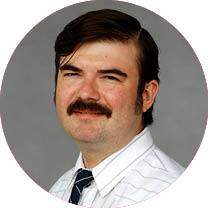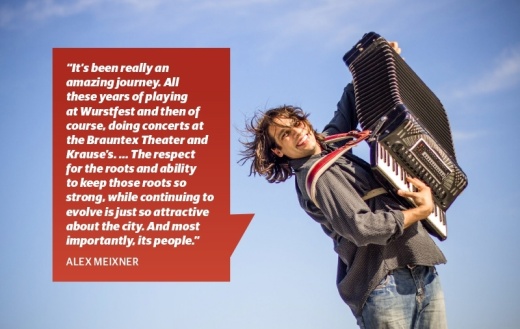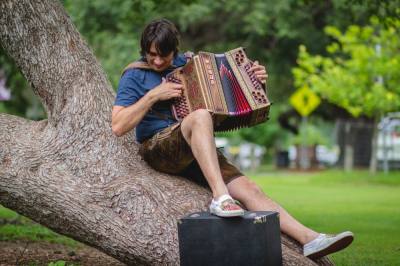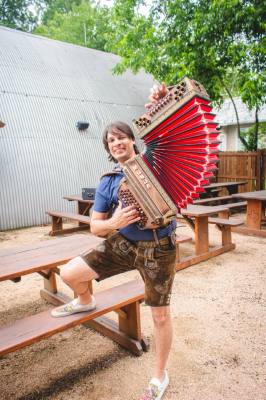Through a partnership with Krause’s Cafe, Meixner will book acts and perform at Krause’s a few times a year and occasionally sit in with other performers.
Since 1999, Meixner has been a frequent performer and headliner at Wurstfest and tours throughout the nation. Meixner also teaches accordion students virtually and via clinics on the road.
This interview has been edited for length, clarity and style.
Where are you originally from, and what brought you to New Braunfels? I’ve been living in south Florida for the last bunch of years. I’m originally from Allentown, Pennsylvania. But Texas is where I belong. My wife is a sixth-generation Texan on both sides. And I’ve been performing in New Braunfels since 1999 when I first started playing at Wurstfest with my father’s band.
It’s been really an amazing journey. All these years of playing at Wurstfest and then of course, doing concerts at the Brauntex Theater and Krause’s. The relationships that I’ve had the opportunity to develop and the people of New Braunfels in addition to the rich history that exists there and the respect for the roots and ability to keep those roots so strong while continuing to evolve is just so attractive about the city. And most importantly, its people.
Has music been your whole life and career? I first started performing on stage in 1982 when I was 5 years old, and at 6 years old, performing with my sisters and my father in my father’s band. I was already doing touring engagements that year.
We were living in Pennsylvania and the first trips where I was on stage were to Kansas City and Des Moines, Iowa. But I had been on stage pretty much since being born. I used to have this set of plastic toy instruments that I would sit on the side of the stage where my dad’s band played, and just honk along. And you know, they couldn’t keep me off stage more than anything.
That’s pretty much been the trajectory of my life all the way. I’ve never really held a job outside of music. It’s just been amazing opportunities that I’ve had, that even my ‘office work’ has been as the executive director of a chamber orchestra in Pennsylvania, and owning a company that books other bands and stuff like that.
Who did you learn accordion from? In addition to accordion, what else do you play? Trumpet was my formal instrument that I studied through college. I did a lot of scholastic stuff, everything from all-county and all-state band festivals to tri-state.
I won the opportunity for two weeks [of] performance study with the London Symphony Orchestra when I was a junior in high school on trumpet.
On the accordion my father was obviously my first inspiration. I played in his band, and he was who I wanted to be when I grew up—if I ever do grow up—but my first accordion teacher was actually my mother; she had played accordion. She taught it and had more teaching patience.
I took a few informal lessons with an amazing accordionist who was from Kansas City, the late, great Don Lipovac. He was a national accordion champion, and just a wonderful person.
He tried getting me to use the right fingerings and he introduced me to a lot of the formal accordion stuff. Which it’s funny how, when you’re studying any vocation, gather up all the materials you can because sometimes it’s decades before you can really understand what you were being given.
Occasionally I’ll find some of the books that Don left me and I’ll start working on them and go, “Whoa, here we are 30 years later, and that’s the stuff that has really fixed my brain, but I’m not really applying it until now.”
You are known for very energetic performances. How do you maintain such a high level of energy while performing? It’s vitamin polka. It’s funny, I don’t really perceive that what I’m doing is a huge amount of energy per se. It’s just when I have an audience—and this is one of the things great about New Braunfels—particularly the audiences are very enthusiastic, and they’re very encouraging.
So when I walk out on the stage, I feel that love already, and let’s face it, you can get that in any kind of atmosphere because people don’t come to a show that I’m playing with the intention of being pissed off. They don’t come being upset. They come because they know they want to have a good time. And so there’s never a nervousness about [if] the people are going to like this or not. It’s a feeling like, “OK, now I have to go out there and just do what I do.” And people are gonna dig it and they show me so much energy and love that it just pushes me to do more. It’s a pretty amazing feeling.
Get to know the accordion
Alex Meixner said the accordion “is shrouded in misconception in so many ways. It is a highly respected instrument indicative of so many different cultures. And it’s a highly ridiculed instrument that is pigeonholed within certain [circles]. It all depends on where you go.”
All accordions have the ability to play melody, harmony and rhythm, but how do they work? Below are some key features of two types of accordions.
Piano accordion
• Plays chromatically (plays all the notes in a Western scale)
• Right hand: piano keyboard
• Left hand: 120 buttons (full size) for bass notes, that play major, minor, dominant 7th and diminished 7th chords. They are arranged in the order of the Circle of 4ths (E,A,D,G,C,F, etc.) Many configurations and numbers of buttons on each side
Diatonic accordion
• Many configurations and numbers of buttons on each side
• None are built to play chromatically (all notes in Western music), but have fixed keys, much like harmonicas
• Bisonoric push/pull configuration of the reeds inside the instrument produce two different notes or pitches when pushed and pulled







